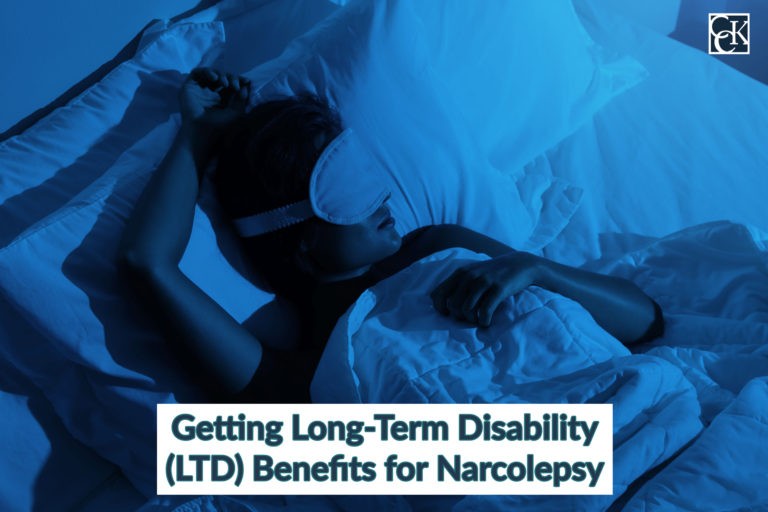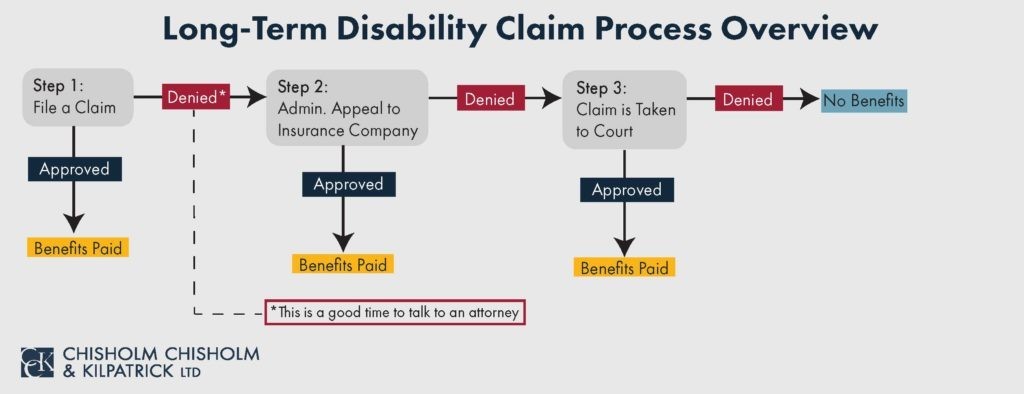Getting Long-Term Disability (LTD) Benefits for Narcolepsy

Around 135,000 to 200,000 people in the United States currently suffer from narcolepsy – although the number may be much higher as it often goes undiagnosed. Narcolepsy affects the brain’s ability to control sleep-wake cycles and therefore can inhibit work, academic, and social activities.
If your narcolepsy is affecting your ability to work, you can apply for long-term disability (LTD) benefits to protect your income. The long-term disability attorneys at Chisholm Chisholm & Kilpatrick LTD may be able to you make a strong claim for LTD based on your narcolepsy.
Reach out to CCK at 800-544-9144 to schedule a complimentary consultation.
What is Narcolepsy?
Narcolepsy is a chronic sleep disorder characterized by overwhelming hypersomnolence (i.e., daytime drowsiness) and sudden attacks of sleep. Generally, individuals with this condition often find it difficult to stay awake for prolonged periods of time, regardless of the circumstances. As a result, it can cause significant disruptions and impairments in individuals’ daily routines.

There are two types of narcolepsy:
- Type 1 narcolepsy – occurs with cataplexy, a sudden loss of muscle tone which can be triggered by strong emotion. Individuals with this type have low levels of hypocretin (i.e., a neurochemical in the brain that helps regulate wakefulness and REM sleep).
- Type 2 narcolepsy – occurs without cataplexy. Individuals with this type usually have less severe symptoms and normal levels of hypocretin.
Symptoms and Causes of Narcolepsy
Symptoms of narcolepsy often start in between the ages of 7 and 25 but can occur at any point in life. They tend to worsen within the first few years, stabilize, and then continue for life. While they can partially improve overtime, symptoms of narcolepsy usually never completely disappear.
The most common symptoms include the following:
- Excessive daytime sleepiness – falling asleep without warning, anywhere, anytime; feeling refreshed upon awakening, but eventually becoming tired again
- Sudden loss of muscle tone (i.e., cataplexy) – cataplexy can cause a number of physical changes, including slurred speech and weakness of most muscles; may last up to a few minutes
- Sleep paralysis – temporary inability to move or speak while falling asleep or upon waking; typically lasts a few seconds to a few minutes; mimics the type of temporary paralysis that normally occurs during the rapid eye movement (REM) period of sleep
- Changes in REM sleep – REM sleep can occur at any time of the day in people with narcolepsy; often transition quickly to REM sleep, usually within 15 minutes of falling asleep
- Hallucinations – hypnagogic hallucinations may happen as individuals with narcolepsy fall asleep; hypnopompic hallucinations may occur upon waking (e.g., seeing a stranger in your bedroom)
Although the exact cause of narcolepsy is unknown, research suggests that genetics play a role in the development of the disorder; however, the risk of a parent passing this disorder to a child is highly unlikely.
Diagnosing and Treating Narcolepsy
Unfortunately, people with narcolepsy are often misdiagnosed with other conditions (e.g., psychiatric disorders) for years before getting the proper diagnosis.
Getting a formal diagnosis requires two specific sleep tests:
- Polysomnogram – a sleep study completed by sleep specialists in which an individual stays overnight at a sleep center. The polysomnogram records brain waves, eye movements, muscle tone, and breathing throughout the night.
- Multiple Sleep Latency Test (MSLT) – involves five scheduled naps, each one about 20 minutes, across the day. Usually conducted the day after the polysomnogram.
A detailed medical history is also important to both the diagnosis and treatment of narcolepsy.
As of now there is no cure for narcolepsy; however, medications and lifestyle changes can help with symptom management. Medications for narcolepsy include the following:
- Stimulants
- Selective serotonin reuptake inhibitors (SSRIs)
- Serotonin and norepinephrine reuptake inhibitors (SNRIs)
- Tricyclic antidepressants
- Xyrem (i.e., highly effective medication for cataplexy)
Long-Term Disability (LTD) Claims for Narcolepsy
If your narcolepsy worsens and begins to interfere with your ability to work, you should file a claim with your insurance company for long-term disability (LTD) benefits. Although it depends on your specific policy, LTD benefits can replace the majority of your income. However, it is important to closely evaluate your policy for specific requirements and its definition of disability.

To ensure your long-term disability claim is approved by your insurance company, it is essential to submit strong evidence that demonstrates how your condition symptoms prevent you from working. It is also important to show proof of your diagnosis and its severity by providing sleep studies and other medical documentation.
If you have an occupation that requires physical labor, such as machine operation or driving a vehicle, falling asleep without warning or sudden loss of muscle tone can make the job very dangerous. If this is your situation, you should emphasize this in your claim for LTD benefits.
Symptom logs or written statements from you, your family, friends, and coworkers can also help boost your claim for long-term disability insurance benefits.
Filing a Narcolepsy LTD Appeal Under ERISA
If your insurance company denied your initial long-term disability claim for narcolepsy, you have the option to file an appeal. At this stage, it is essential to reach out to an attorney specializing in the LTD claim process.
Long-term disability attorneys at CCK are versed in ERISA law, which governs many long-term disability insurance plans. Under the Employee Retirement Income Security Act, or ERISA, the appeal stage is the last stage in which you can submit new evidence before your claim is taken to court. The LTD lawyers at CCK may be able to help you gather evidence, evaluate your policy to ensure your condition meets the terms of your policy’s definition of disability, and handle communication with your insurance company and doctors.
How CCK Can Help You Get Long-Term Disability Benefits
The long-term disability lawyers at CCK understand that getting LTD benefits for narcolepsy can be a challenging and overwhelming process, and we may be able to assist you every step of the way. Schedule a free case review by submitting this form today.
Share this Post
